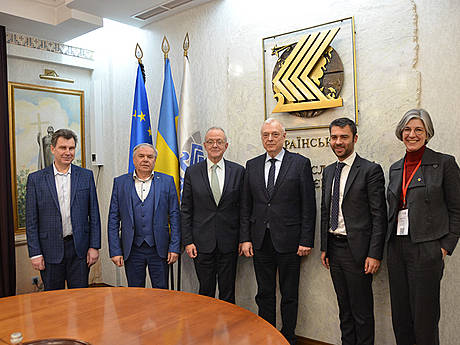
Ukrainian and French entrepreneurs and industrialists have been cooperating since 2002. Recently, the parties held a major bilateral conference on decarbonization, green transition and the use of hydrogen energy.
MEDEF International is the most significant representative of French business uniting 800,000 companies of all sizes and industries.
The MEDEF delegation arrived in Kyiv with a diverse group of companies interested in cooperating with Ukrainian partners and the French are ready to provide advisory, technical and other assistance in rebuilding Ukraine's infrastructure, housing stock, etc. that was damaged by the war.

The meeting with the ULIE leadership was attended by representatives of the Association and companies: Echelles Riffaud, Desautel Group (fire equipment, fire trucks); international group Antea France (engineering services for water supply systems, environmental protection, infrastructure); Alstom (high-speed trains, monorails, trams, subways - rolling stock and infrastructure); Enedis (national electricity distribution company of France, a subsidiary of the state-owned Electricité de France); Novakamp (energy, water supply, infrastructure, waste management, etc.); French Healthcare, Invivox (modular hospitals, training of psychologists and trauma surgeons); French international charity organization Electriciens sans frontières (Electricity without Borders) (equal access to electricity and water supply).
According to Serhiy Prokhorov, First Vice President of ULIE, the priority issues for cooperation with the French side are the restoration of Ukraine's energy sector and solving problems with the rapid construction of housing stock (modular towns) for internally displaced persons. There are about 7 million IDPs in Ukraine, including many families with children and the elderly, who need comfortable living conditions.
Ukrainian industrialists have developed a technical project for the construction of typical modular towns: however, there is a lack of funding. Since we are talking about billions of dollars there is hope for attracting international funds and grants.

CEO for Europe and Africa, EGIS (territorial development, smart solutions in infrastructure, urban planning), Mr. Mathieu Loussier, said that they have been working in the Ukrainian market for 25 years. The company's engineers could develop a concept for the construction of modular neighborhoods and have experience working with international financial institutions. EGIS will provide ULIE with the necessary documents in Ukrainian which could be the beginning of project cooperation.
As for the energy sector it is one of the biggest challenges for the Ukrainian economy. Yuriy Bondarenko, Chairman of the Technical Committee of the International Council for Large Electric Power Systems CIGRE in Ukraine, spoke in more detail about this.

"Until February 24 the Ukrainian power system was one of the largest in Europe with a generation capacity of 56GW. On March 16 we integrated fully with the EU system. However, in the fall Russian attacks on Ukraine's energy infrastructure caused the first blackout in the history of our independence (and in the last 100 years in general). However, we managed to overcome this challenge by stabilizing the system. Currently, the generation limit is 10-12 GW and consumption is almost three times less than in the 90s," the expert emphasized.
The key tasks now are the availability of the necessary equipment (transformers), etc.
"We remain optimistic and plan the energy transition of our system. This includes the construction of modular mobile heat and gas turbine plants, and the introduction of new technologies in the reconstruction of thermal power plants. Renewable energy is something that needs to be implemented in power grids," summarized Yuriy Bondarenko.
The French side replied that they have technical solutions for using various energy sources and optimizing its consumption. Savings can reach 10%.
Cooperation in these and other areas will continue coordinated by the ULIE and MEDEF respectively.